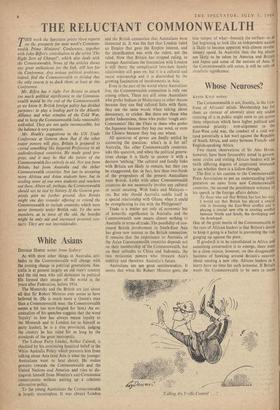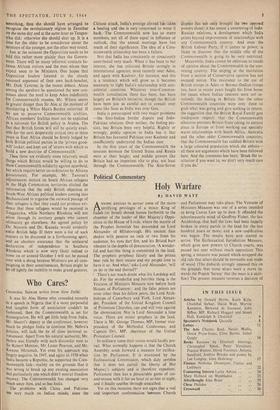Whose Neuroses?
Kurit Kne writes:
The Commonwealth is not, frankly, in the fore- front of Africans' minds. Membership has for them an element of anomaly since any undue stressing of it in public might seem to cut across three objectives which have higher political and emotional priority: non-alignment in the East-West cold war, the conduct of a cold war (and potentially a hot war) against the Republic of South Africa, and unity between French- and English-speaking Africa.
Two recent observations of Sir Alec Home, however, have been favourably noted in govern- ment circles and visiting African leaders will be (with differing degrees of scepticism) interested to see whether there is a follow-through.
The first is his caution to the Commonwealth Press Association to put an understanding inter- pretation on news from new Commonwealth countries; the second the penultimate sentence of his speech in the foreign affairs debate:
To those who say that Britain has lost her way, I would say that Britain has played a crucial role in lessening the East-West conflict and is playing a crucial new rOle in averting conflict between North and South, the developing and the developed.
One of the great merits of the Commonwealth in the eyes of African leaders is that Britain's desire to keep it going is a factor in preventing the rich ganging up against the poor. If goodwill is to be consolidated in Africa and something constructive is to emerge, there must be a close season, however, on this disagreeable business of hawking around Britain's neurosis about needing a new role. African leaders in hurry have no time for such nonsense. If Britain wants the Commonwealth to be seen to mean
"Calling Air Traffic Control .
something, then the should have arranged to recognise the revolutionary rig-Erne in Zanzibar on the same day and at the same hour as Tangan- Yika did: otherwise she should shut up. It is a time for the older to be considerate about the neuroses of the younger, not the other way round.
Just at the moment the Opposition needs to be told this rather more plainly than the Govern- ment. There will be many informal contacts be- tween African visitors and the men whom they expect soon to be Ministers. One hopes that Opposition leaders listened to the closely reasoned argument of their own back-bencher, Mr. Dick Taverne, in the recent debate. Alone among the speakers he questioned the new con- sensus about the need to keep Aden indefinitely for Commonwealth reasons. Mr. Wilson seems io greater danger than Sir Alec at the moment of Shouldering a White Man's Burden uninvited. If We are to preserve Commonwealth civilities, African members' frailties must not be exploited as a rationale for British policy in Arabia. The fact that British forces will still be quietly avail- able for the next desperately critical two or three Years in East Africa should be firmly lodged by both British political parties in the 'private good- will' locker, and kept out of 'straws with which to build a new doctrine of Commonwealth.'
Then there are evidently some relatively small things which Britain would be willing to do to Show Commonwealth solidarity against apartheid, but which require better co-ordination by African governments. For example, Mr. Taverne's. adjournment motion on South African refugees in the High Commission territories elicited the information that the only British objection to South-West African political leaders coming into Bechuanaland to organise the outward passage of their refugees is that they could not produce evi- dence that these refugees would be received in Tanganyika, while Northern Rhodesia will not allow through its territory people who cannot Ultimately go elsewhere. An agreed policy by Dr. Nyerere and .Dr. Kaunda would evidently enlist British help. If there were a list of such matters to be discussed in a forthcoming spirit, and an absolute assurance that the unilateral declaration of independence in Southern Rhodesia which is now very likely indeed to come on or around October 1 will not be passed over with a shrug because Ministers are all cam- Paigning in their constituencies, Britain might be Let off lightly the inability to make grand gestures.































 Previous page
Previous page